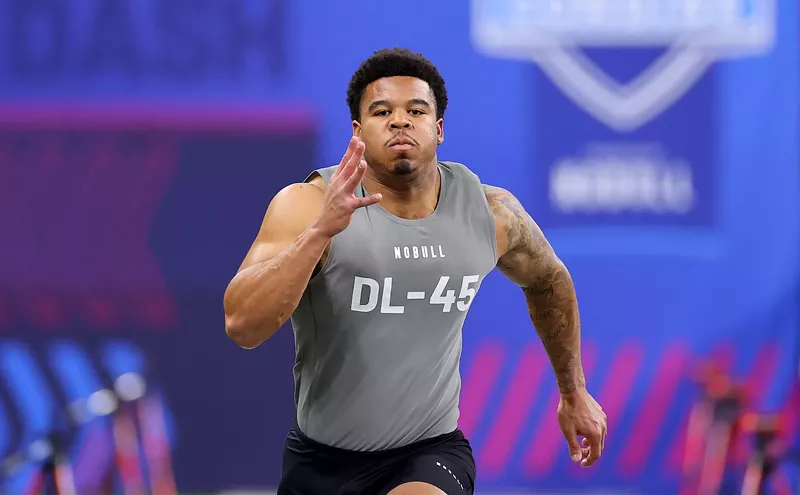I frown, then peer down at my timepiece. Ross's two assistants look on, eyes wide, puzzled. Chauser, his mouth held open by metal prongs, is unable to hear this commotion; his headphones are tuned to a Simon and Garfunkel disc.
The photos are for some lectures, Ross explains. Very important for other periodontists.
I scan the small room, buzzing with surgical apparatus, then respond, "You have 57 minutes."
Dentistry, unlike Formula One racing, track and field, or bobsledding, is not typically associated with time trials. But two weeks ago Emily Alford, a representative for Ross, boldly claimed her client was attempting to push the limits of dental speed. It sounded historic — the dental equivalent of Chuck Yeager's breaking of the sound barrier. On Thursday, November 10, the periodontist and 25-year veteran of the Miami tooth-implant business would give Chauser, who has no lower teeth, a brand-new set of pearlies in less than one hour.
So at 8:45 a.m. on the historic day, I arrived at the Bonneville Salt Flats of the South Florida dental world — the offices of Scott B. Ross, D.D.S., and Beatriz E. Terry, D.D.S. — next door to the offices of an anorectal specialist in an unassuming two-story medical building in Kendall.
Soon I met the speedy periodontist, an exceptionally tall, lanky fellow with salt-and-pepper hair, glasses, and a distinguished bearing. If he had acting skills, he easily could have played a soap opera dentist. His hands looked big and he had thin, nimble-looking fingers. He also glided quickly through the office. After sitting down in a small room plastered with dental credentials, Ross pointed to a laptop and coolly explained how, with the aid of some whiz-bang technology from Sweden, he was going to give Chauser teeth.
Ross gets wonkish on the technology (CAT scans, 3-D images, dental molds, premade teeth), and he deflects naked speed questions ("I don't like the word fast. My practice is geared to do good.") but, when pressed about speed, he is confident. "Yeah, I'm sure I'm the fastest in South Florida," he says with a slight smile. "I just don't like the word fast."
Moments later Ross reveals that last week, a busy week, he performed 30 implant surgeries.
The quest for speedy dentistry is not, by any means, new. Ancient Greek and Roman dentists were prized for swift tooth extractions, and Pierre Fauchard, the father of modern dentistry, was known, in eighteenth-century France, for his quick cavity-fillings and orthodontics. But speed dentistry didn't enter its golden age until recently. Driven by aggressive investment from people who want nice teeth, and the harsh economics of toothdom, dentists have sped things up dramatically.
Ten years ago, it took roughly six months (surgery, healing time, another surgery) to get an implanted tooth. Five years ago, it was a two-day process. Two years ago, one day.
Now, however, Ross is attempting to "up the ante," says Gordon Douglass, the former president of the American Academy of Periodontology. And Douglass, who spends on average a half-day for a similar surgery, is skeptical. "One hour? That might be pushing it." Later he adds, "There is a biological limit to how fast you can do this."
So I readied my watch and moved aside as an aide readied Chauser — almost like a mechanic would ready a world-class hot rod.
60 minutes left
In scrubs and mask, Ross enters the surgery room at 9:38 a.m. He seats himself in a swivel chair next to Chauser, glances at his foot pedal (which controls the drill). He briefly chats with his two assistants, and then places a molding — which looks like a gelatinous mouthpiece — into Chauser's mouth. "Okay. Now," he says, suggesting that the surgery is commencing. The time: 9:40 a.m.
55 minutes left
I grant a time-out so Ross can snap a picture. It lasts about two minutes. I am charitable.
43 minutes left
Ross is making quick work of Chauser's gums — tapping the drill pedal, barking out calls for different tools and drill speeds in dental code: "Three-point-five by sixteen.... Now four-point-three." "Give me the sleeve and the next pro." "Three-point-five by thirteen." In seventeen minutes he's completed his drilling. Meanwhile Chauser, who is paying nearly $25,000 for this surgery, is kicked back, blood-free, listening to Simon and G.
42 minutes left
Ross takes a second time-out, just thirteen minutes after his first — for more pictures. I declare a new rule: Any stoppage due to photographic intrusion will be tallied. This time will be added up and tacked on to the end of the surgery, as penalty minutes, as in soccer. This stoppage takes eight minutes.
32 minutes left
Basnny Hernandez, one of Ross's assistants, darts across the room and picks up six small containers that look like bottles of Visine. Ross glances at the containers and grabs one. "The implants," he explains.
29 minutes left
Ross quickly places the six implants in position — forming the foundation for the teeth. But then he encounters a problem. "It's the mount on the implant," he says, as he wiggles a tiny wrench.
15 minutes left
Using forceps, Ross finally frees the mounts and then proceeds to screw the implants in.
14 minutes left
At last, Dr. Steven Samson — Chauser's white-bearded, bespectacled general dentist and Ross's collaborator — enters. Samson moves slowly, smiles genially, and says a few words to Chauser, his long-time patient. A nice bedside manner, it seems, but is this guy ready for speed dentistry? I inform him of the clock. He's not even in scrubs.
9 minutes left
"Steven, Steven," Ross says loudly as he holds the teeth in his right hand. But Samson is in another room. When he enters, he's still not suited up. As Samson stands there, without a mask or gloves, seemingly unworried, I think back to presurgery. "I know I can do it," Ross had said. "But it also depends on Steven...."
3 minutes left
The team is given a three-minute warning. Ross struggles to fit the premade teeth on the implants. He's moving back and forth — placing the teeth in Chauser's mouth, checking the fit, pulling the teeth out, shaving them, fitting them again.
0 minutes left
Samson is suited up, finally. But as the two dentists examine the "thinness" of the teeth, my watch alarm goes off, noting the hour is up. I fear they don't hear this amid the cacophony of dental noise. After I alert Ross, he shrugs. "I don't care. It doesn't matter. This is not about speed."
But then I remind him. Bonus time. At least 12 or 13 minutes.
5 minutes over
Seemingly aware of the clock, Chauser, still in the chair, tries to cheer his surgeon. "Even God can't do it this fast," he mumbles. A laugh ripples through the room. Moments later Ross continues to tweak the premade teeth, and frets as he moves them in Chauser's mouth, adjusting the bite. They aren't fitting easily. "The lab could have done a couple of things that would have made life easier," he says, wincing.
14 minutes over
"See," Ross beams, pointing to Chauser. "He has teeth." Ross stands up, signaling that the surgery is over. Chauser, formerly toothless, climbs out of the chair and shows off a $25,000 smile.
Like the 2000 presidential election, this surgery ended in controversy.
Postsurgery analysts credited a total of 18 stoppage minutes to Team Ross. So, technically, the 18 stoppage minutes, subtracted from the 74 minutes of surgery time, result in 56 minutes. A triumph for Ross.
Suspicions lingered. Following the allegedly completed surgery, Chauser, I was informed, would go to Samson's office, a short walk, for some final review. What? What was this additional phase? And, how long did it take? Doesn't it count in the final calculation?
But Chauser walked out of the office, lucid, pleased, and without a speck of blood. He'll be back next month for a new set of upper teeth. Another $25,000. "I didn't want 30 years of worrying about loose teeth and root canals," he said.










